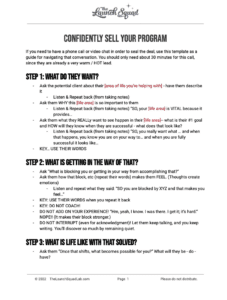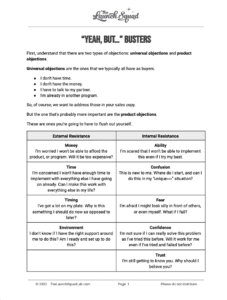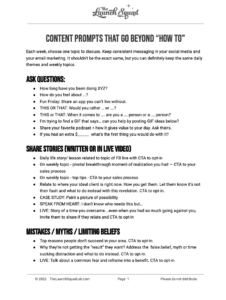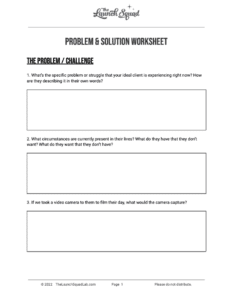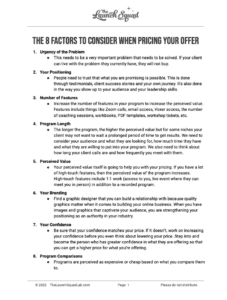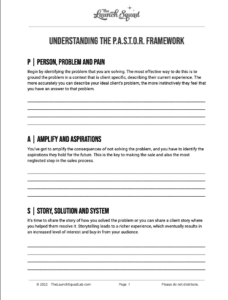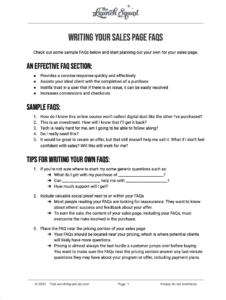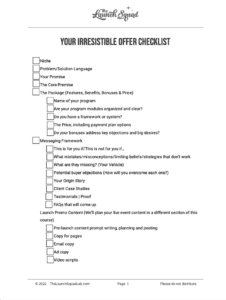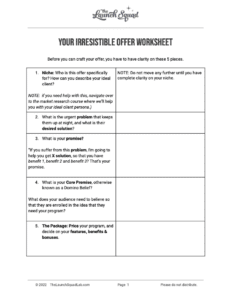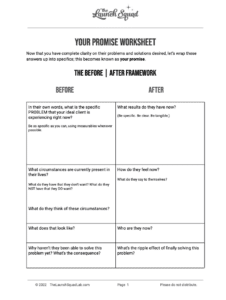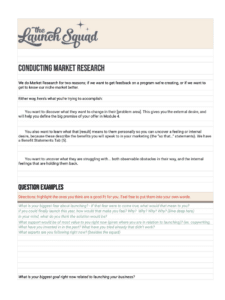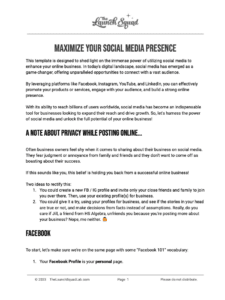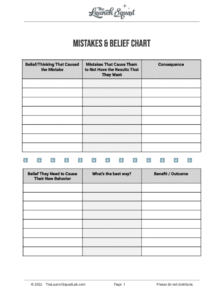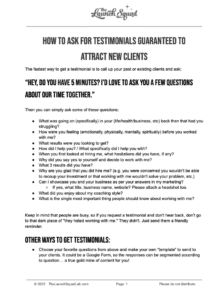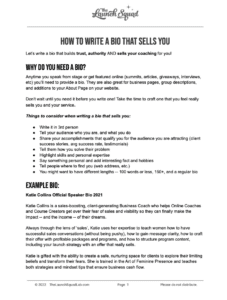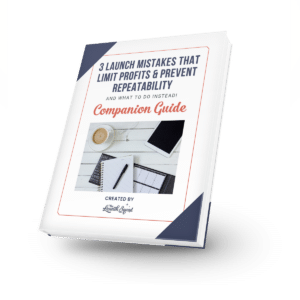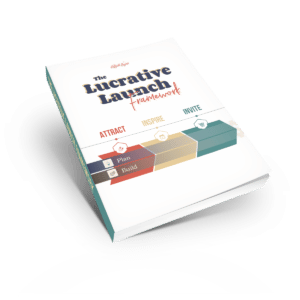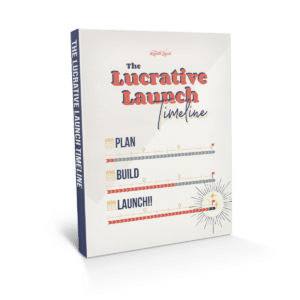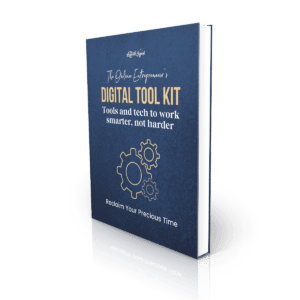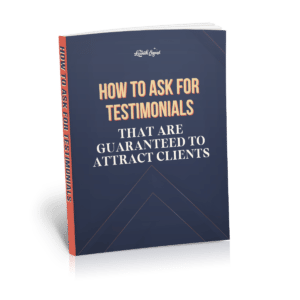- Website: witandwire.com
- YouTube: witandwire.com/youtube
- Podcast: witandwire.com/podcast
- Instagram: instagram.com/witandwire
- TikTok: tiktok.com/@witandwire
Jeffrey: Welcome to the light and your launch podcast today, we're talking about online course creation. So stay tuned.
Jeffrey: Welcome back to the show. I'm Jeffrey Someran, I'm back again with Katie Collins. And today we've brought on a guest to help demystify what it takes to manifest a digital course of your dreams. This episode is all about how to get through. The mistakes to avoid and details you can't miss when building your online course, you might want to get out your notebook for this.
Katie, would you please introduce our guest
Katie: I would love to our guest today is an online course creator and podcast producer before starting her own. business. She managed marketing teams at some of the top education. tech companies, including her previous four-year role As the director of marketing engagement at teachable, she was also the senior launch manager at safety's company where she produced 15 to 18 course launches per year with a remote team of 15 people.
She's also a top rated general assembly instructor having taught over a hundred classes since 2015, and she created And built the curriculum of one of their most successful boot camps. She's the founder of Whitten.
Where she helps creators turn their skills and passions, into profitable online businesses. And she's on a mission to help more diverse business owners earn money online doing work.
They love she's produced multiple top 50 hosted over a hundred podcast episodes. And she's the host of the wit and wire podcast. She lives In PR in Brooklyn and pre pandemic, she used to sing in a pop and rock, choir in New York city. she's. One of those crazy people who loves to eat ice cream in the winter time, Welcome to the podcast age, Melissa gala.
Melissa: Thank you for having me and for sharing the most important stats that everyone needs to know that ice cream habit is so real.
Katie: Oh, and the fact that you're a singer, I sing in the Denver choir league here too. So I just like, always love like, oh, yay. Another singer. That's awesome. Yeah,
Melissa: Yeah,
Katie: Awesome. So let's dive into this. We feel really excited to have you on board. We know that a lot of our clients um, and you know, audience just get overwhelmed by the whole concept of creating a course. Like we're really good with ideas and maybe even jotting down an outline, but the overwhelming feeling that people get when they're creating a course.
And I myself felt the same way, even though I have a master's degree in education. So it's, if we're speaking to the audience out there. If you're somebody that's been feeling overwhelmed by creating a course, this episode is for you and you're not.
Melissa: you're not alone.
Katie: so, so first of all, Melissa, we know, um, you know, from your website, you were saying you went against your dad's advice. He was like, get a business degree and you're like, oh my God, that is so boring I'm going to go get a music degree. instead. So take it from there. Tell us a little bit about your journey.
Melissa: So I've always joked that I never really knew what I wanted to be when I grew up. And I think early in my career, even when I was choosing that music degree, I was always just making my best guests based on what I enjoyed doing and how I thought I could use that to help others. So at first I thought, let me get this degree.
It's a bachelor of music, but it was about the industry. So I worked briefly as an intern at a record label and quickly found. Although I loved music being in the business of it just didn't quite feel right to me. So as soon as I graduated, I decided to just not use that degree. I had earned over four years and move into event production and to kind of do the fast forward.
I felt like any of the skills that I had developed in college about the music industry, the business industry, but also just working with others. Those can translate across any job that you want. So in live corporate events, you learn a lot about adapting thinking on the fly you're onsite in these bigger conferences, tech conferences.
And I think that job taught me a lot about just kind of being open-minded. And now as a business owner, it's not about having a plan, so perfect. It can't fail. It's assuming that things won't go the way that you think and just kind of adapting.
Jeffrey: Hm.
Melissa: So I moved through that industry before realizing what I really loved and had all that.
Was to teach and to help others. So I landed a dream job at general assembly, and that was really the start of not only working in the education tech space at general assembly for remeet and then teachable, but also teaching on the side. So I think between those two, between working at the tech companies, working for a big name course creator and getting to be a teacher in the front of a classroom.
And then later in digital classrooms, that's kind of how the career fell together. But now I feel grateful. I didn't know what I wanted to be when I grew up, because course creator, certainly wasn't in the book I was reading at age 17. So
Jeffrey: Re
Melissa: it helped me keep an open mind. So I think to anyone who's feeling that way, there's just so many opportunities now that we never could have dreamed of.
And I think it's a positive to be able to adapt and to see opportunities to use your skills, to help others
Katie: totally
And, You know, as someone that um, when I started my coaching business, I was a former teacher. And when I started my coaching business, it didn't Take off as quickly, as I thought it would. And I was a little, uh, afraid of sales and all of that. And I ended up getting a job with a coaching company and learned sales from them and learned management and team building And managing the team and all of the skills that I use today in the launch squad And so I feel like for people that are like, oh, if I accept a job, I'm giving up on my business and I'm a failure.
I say no way it could be. the leg up Because I think other people see your brilliance before.
Melissa: to be more you do.
Katie: that's what that company did for me. They really spotlighted a piece of my brilliance that I just couldn't even see myself. So I always think it's great to be able to work for other people. And get the skill set that, you know, get that development and get paid for it. So,
Melissa: that. And I couldn't be where I am today. If I hadn't started off taking jobs on the side teaching at general assembly, that was a job I had on the side, in addition to a full-time job. And then after some of those classes, people would come up to me and ask if I offered tutoring or if I did consulting.
And even though I did it. I said, absolutely. Let me get back to you with my rates and then boom I'm in business. And I think that's another misconception about being a business owner is that you don't have to come into it with a fully formed idea of how it's going to look in the future. You just have to be open to opportunities and tell people what you're available for.
So I think that you don't have to have all those details figured out you don't have to get so many shred at the beginning. I think there's something to be said for just kind of keeping an open mind.
Katie: Yep.
Jeffrey: love that. I love that. And I think there's, you know, every experience we have is a stepping stone to something else. You know, it, I can't tell you how many times I thought back in the past, back in the day, like, cool, this is my forever job, or this is my career path. And then yeah, that goes out the window pretty quick.
Melissa: yeah. And working on the side, you have a huge opportunity as well, because you do have income. So I think you don't have to immediately take every money opportunity that comes your way. You can be more. You can also use that as an opportunity to try building an audience like with and wire for the first six months, I was really just putting out content.
I was trying to build up an email list. I was trying to see what I liked talking about in addition to what stuck and what resonated with people. And if I had just left my job cold Turkey, I wouldn't have had that kind of freedom. So I think starting on the side has a ton of advantages. And I think maybe we don't see those as advantages as often as.
Jeffrey: that's really important. And I love how you said that, you know, basically people were asking you like, do you do this? Hey, do you do this? Like, that's a really, that's an, I think that's a strong indicator. Your strengths or, you know, possible directions. What are people asking you about and what are they asking you for?
They obviously look to you as a leader in that place, right?
Melissa: It's one of my favorite ways to find a profitable course. Because if people continue to ask you the same questions, Hey, how did. I managed to get in shape. How did you manage to launch your Etsy shop? If you start to hear those questions again and again, that's a great sign that you have a business idea, and even to get more specific, let's say you've started to offer any kind of one-on-one services, whether it's coaching or freelancing.
If you start to notice trends in the problems that you're solving for people that repeated pattern is also a good indicator of a course idea, because you could try to package that and sell it into a signature.
Jeffrey: uh, this is okay. This is perfect. This is perfect. Okay. So. Once you've got those questions and you've identified, oh my gosh, I could make a course about this. W where do you start? Where do you begin with that?
Melissa: Before you start development. I think getting the foundation of your course idea is one of the most important and maybe overlooked parts of course creation because too often, people come to me and they talk about skills. Like they want to teach running tips. They want to teach Instagram tips, but ultimately people are looking for solutions.
To their problems. So your course is going to bridge the gap between where your students are today and where they want to be. And it's not about creating desire or making people believe something that they don't instead. It's about doing the research to figure out what do people, all right. Desire, what do they want?
What do they have today? And how can my course be positioned as the solution to their problem? There will be other solutions. There will be services. There could be books, there could be physical products. So what you want to do is first do that research, figure out what is the problem that I'm solving and who is the ideal student, because the best profitable courses that scale over time solve one problem for one.
Jeffrey: that is huge. I hope everyone was listening right now. Because I've heard it many times where they're like, well, I've got this course and it can solve this and it calls solve this and then they can teach them this and then it can do this and this. And like, they need to know all of these things. That's huge.
Melissa: it's like the curse of the well-intentioned right? You want your course to be able to help everyone. And we see it as limiting both our growth, potential, and our ability to help people. But I see it as the opposite. There's some classic marketing example about two billboards. One says, do you have allergies called the.
The other says, do you break out in hives when you eat fruit, call this number. Now, obviously that one is much more targeted, but if that's you, you're going to stop driving and call that number immediately because people are looking for personalized solutions to their problems. So if you can create a personalized solution, that's how you're going to actually make more sales.
And I don't see it as excluding people. I see it as better serving the people who you are most equipped.
Jeffrey: um, I love that now. Now, in your opinion, what about, um, about somebody who has a, kind of a coaching business where they do kind of solve multiple problems or they, they help in, uh, a broader sense. How can somebody translate a one-on-one kind of coaching business or consulting or something like that into a digital.
Melissa: I think coaches, frankly, and freelancers, anybody working one-on-one is a perfect candidate to become a course creator because as you start to work with more clients, even though yes, everyone has their individual quirks and needs. There are probably. You probably do the same thing during the first week that you work together.
There are questions that continue to come up over your span of your project. So what I would do is start to think about individual clients who were your absolute favorites, what was it like to work with them? What were their biggest challenges coming in? What were the problems that you solve together?
And to think about the big picture, what is the outcome that they hired? You. If you were to picture your client as a before and after, what is that transformation that you helped them with? And then maybe you can take some notes about what are the major milestones that you got between point a and point B, but also what were some of the biggest obstacles?
Because I think that's a piece, a lot of course, creators. In my eyes, there are two key elements of a course. There are actions which moves students forward and objections, which prevent them from moving forward. And if you want to have a profitable course that not only sells, but is also effective, you have to think about an anticipate those objections and flip them into opportunities.
So, as an example, let's say you were teaching people how to start a YouTube. A major objection is going to be, I don't want to spend money on expensive equipment. So what I would do on the sales page is say, no equipment needed use the iPhone you already have. And then of course, in the program, you teach them how to do that.
So you're anticipating the objection to not only land the sale, but to actually help them successfully complete their objectives.
Katie: Hmm. Yeah, that's huge. I I'm big into the, the whole, like you have to preemptively know their objections and you have to address them before you make your offer. That's something we teach about all the time. Um, Here's here's something that I see happen. Um, And I feel like it's happening in our own course as well. It's like, You know, we created this course how to create, how to craft an irresistible offer that sells. And then there's like, when I think about the objections people have or um, things that get in people's way of completing it, then I'm like, oh, okay, let's add a module on this. Or let's add a bonus that solves that problem.
And all of a sudden it becomes almost like an octopus, you know, with eight arms. And so you know, Jeffrey and I, um, we met years ago, but we reconnected in a community. and, you know, we spent maybe, you know, maybe $3,000. Specific online course. Um, and I see that people in that community, are like there's so much here.
I'm old now I'm overwhelmed. So at what point do you. give your course creators permission to say not your
Melissa: not your lane,
Katie: You don't have to write, be the end all be all like, um, you know, yeah. how do you coach people on? Yeah, that's definitely an important thing versus uh, it doesn't sound like your lane. Don't worry. You.
Melissa: great question. I think there's almost two elements. One is how do you know if you're providing too much content? The other is how do you know if it's out of. And I think they're similar, but slightly different. So we've talked before about this transformation. Students are in a place today. They want to be somewhere else by the end.
And I think a big part of being an effective creator is deciding what to leave out. So for example, maybe you nerd out about all of these very exciting things and this research that you've done, but you want to really ask yourself, does my student need to know this in order to achieve their outcome or not?
Because the more you put in the. The less likely they are to complete the course. So your goal is to get them there with as few lessons and as few actions as possible. And that's why one of the biggest mistakes I see, especially when it comes to selling is people talk about the 52 hours of videos that they have inside this course.
And I'm like 52 hours. I could watch a whole 10 seasons of a show. Like I can do a lot with that amount of time. People don't want to watch videos. They want to be somewhere that they aren't today. So instead you should try to make it as short as possible, but then when it comes to like scope creep, I think to get back to the, how do you know it's not your lane?
What I do in a lot of my programs is I refer people to other programs, other products and others. A good example is marketing. I think very few people are experts in every single social media platform. I certainly don't try to be. So what I do is I give just the essential info on kind of the differences between them.
I help people decide what strategy could be right for them. And then I offer resources to say, okay, you've decided to use Pinterest. And you've decided to use TechTalk. Here are some recommended resources that I would recommend. And I think not to get too deep into strategy, but those are also partnership.
To potentially bring in other experts to either have a video within your program and then to promote their own business or to do something with somebody else. But I think the biggest mistake you could make is trying to make sure that you always keep it to only one course. There may come a time where you have to acknowledge that you are actually starting to develop a second.
Either because the topic is different. The outcome itself is now different or there are always beginner, intermediate, advanced stages. So instead of helping, let's say podcasters, I have a podcast on. I could've made that program about not only launching a podcast, but growing it and expanding it and hitting hundreds and thousands of downloads.
But what I learned after doing some research where I actually talked to aspiring podcasters over zoom, they told me that that felt unattainable to them. They were too far away for even hitting 10,000 downloads, where that felt impossible. So the goal that they want. Was to launch a podcast, maybe get their first 1000 downloads that felt doable.
So it's no longer helpful for me to try to get them into phase two, all within one program. That could be a second course, potentially. So I think if the scope creep is going kind of to help your successful students, that's a well-intentioned thing course, creators gardening. Can I hit because they're going to graduate and they're going to ask you for more.
So you have to ask yourself, is this really part of this course, or is this a new program?
Katie: Yep. I love that I've done a lot of sales for other companies, um, you know, all in the coaching industry. So I've seen like the gamut of programs and price structures and, Um, you know, although I'm, uh, I'm, I am a big fan of high ticket sales, I think there's a really great, place for it And it adds value and consistency to uh, your Um, income. I think sometimes these bigger programs are so big That it does feel like, you know, I'm going to take you from zero to a hundred and if they don't believe that it's possible, then they're not gonna be.
Melissa: not going to buy it.
Katie: And that's. I think people miss that mark in the marketing is to help them become the person who, who is willing to do that. Or you're right. break it into or three this is phase one, you can just buy phase one. And when you're ready, you can upgrade to phase two. instead of trying to sell a three-phase program for $20,000, you know,
Melissa: I also think both students and course creators are bad at guessing how long things will take. Like if you imagine something as big as. Starting a whole online business and making your way to six-figure months. Like obviously that's something that takes a little bit of time and not only does it not feel attainable, you also have no idea how long that will take.
So for most course, creators, not even just new creators course creators generally, I think having an approximate duration of one to three months is the sweet spot because most of us can't plan. Further than three months out. There's a reason why new year's resolutions never work. We have a hard time planning in these larger chunks.
So I think one to three months is about as long as you could plan, you can leave a little bit of buffer room. I would definitely anticipate that people will be slower than you think. And that's totally fine. But I also think that for students mentally, if they see a three-month program, they'll think, okay, I can make the time for that.
If I saw that your program would take me nine months, I would think. I don't know about that. That's a really long time.
Jeffrey: right. Yeah. We have, we have a market mini course, a market research mini course. And we're thinking like, how long, how long would this take somebody? And it's like, well, you can probably blow through the content and a couple of hours, but then to implement everything, setting up appointments, asking questions, filling out responses, listening to the responses.
Right. There's then that's where the time is. So it's like, oh, how long would that take somebody
Melissa: I'm so glad you brought that up because yeah.
Jeffrey: for.
Melissa: check it out, link in the description. I'm sure. No, I think that when we talk about this, like one to three months, that is not how long it will take them to sit down and watch videos. That is how long it will take them to actually achieve the outcome of the program to do it. Exactly.
Katie: Yup. Yup. And that, I think it's important Um, like as a former teacher to give them the parameter of like you have 14 days to do this. I mean, if you had one day. to do it, you would do it in one day. If you had five days, you do it in fact. right. But 14 to me felt like, Hey, that's time for you to do the outreach. in the first couple of days, get the calls booked do the calls, you know, look at your data, compile the data and come back to. and you have 14 days to do that.
It just it, to me that felt like that. sweet spot. And I, of course, I never recommend someone do something. I haven't done So that. was my experience. I gave myself 14 days and. I did it in 14 days. So it just, I like to call it a project. Like you're working on a project and this is where your focus is, and don't get distracted. This is the project that you have 14 days to get done, and then we can move forward, You know, but, um, I just think it just reduces the overwhelm for people. Um, you know, so our course is six modules and, you know, but I'm like stop focusing on that and we send emails on a weekly basis. Let's say It's week two, You should be. here In the Right. And just try to guide them along so they know, you know, I don't want people to say I'm behind, but I just want people to know, you know, we we've spaced out. we say it's a three month experience with us, but we give them two months to go through the information and take action. So they have an additional month with us to ask more questions continue to take the action. and that kind of thing. Um, I think the worst is when they complete the module, Now the program. And then.
we'll get That further support. So.
Jeffrey: That brings up actually a good question. I kind of want to skip too, because if, because you just brought that up is to ask Melissa, like, what's, what's the best way to, or what are, how am I going to say this? Um, what's an effective strategy to make sure students actually succeed in completing the course.
Like how do you, how do you actually get them?
Melissa: The two answers, maybe the second is more controversial. The first is that in addition to creating videos, I think it's more effective to think about your course outline in actions. So when I sit down to outline a program first, I think about what those major miles. What are those key pieces? It let's say somebody is launching a podcast, right?
They probably need an idea. They need to prepare episodes, recording, editing. I think that's a nice, straightforward example. You can start to see how those would become sections, but a section on recording a podcast. Probably doesn't have that much content in it because most of the work is actually recording.
It's the doing right? So the key part of that section is me encouraging people to record it's me giving them the tools to record. And I think for courses, a lot of us can think beyond just a video. Is there a worksheet that could be helpful? Is there a sound check checklist I could provide that they can print out and have next to them while they record?
Are there templates I can use? Are there scripts that I can prepare to help them prepare their podcast episode? What are the things that you can do as a creator to shortcut the overall time? It would take them to do the task. And that to me is where those templates scripts even exist. People learn really well, by example.
So if you can show them examples and then as your program grows, past student work is amazing to showcase within a program. I think that really helps. And then I think the other thing you can do before I get to my controversial. Is offer support. I do not mean having an email address people can write into, I mean that, especially if your course is newer, I like to do things that don't scale.
I do. One-on-one onboarding calls with all students. The first time I run a new program, I have weekly live group coaching. I have a committee. You don't have to do all of these things. I think it's more about just engaging with people and creating two way communication. So the more that they know that when they get stuck, they can trust you to help.
That builds their trust in you. That helps them continue to move forward and to build momentum. So I think those are a few things to quickly recap. It's encouraged them to take action. It's provide resources that shortcut their time to accomplish that action and to be available for support. And my controversial thought is that let's say you do all of those things at the end of the day.
It is not your job to make your student want to do this. Yes, it is on you to provide all of the resources. I think there's also a little bit of, you know, motivation that comes in when you're a course creator. It's about really helping students see themselves as doers. And that's something I talk about a lot in my programs is that you're not just teaching curriculum.
You're also empowering them. You're helping them move forward. You're helping them take small steps at the beginning, let's say, so they say, wow, I'm doing it. I'm on my way. And not just overwhelming them right from the start, but then at a certain. Your course is never going to have a 100% completion rate.
And that is not because you're not a great instructor. It's because everyone else has a lot going on in their life and you cannot control their actions. So as long as you trust that you've done your best work to really put your best resources, videos, all of that forward. Then I don't want anyone to expect that the goal should be a 100% completion rate.
Jeffrey: I love that. You said that it's a, it's a little bit of parenting 1 0 1 right there too. So it all
fits together.
Katie: yeah, I think it goes to like the four agreements, right. It's like, don't take it personal because I think that's what happens is like our ego, gets bruised if you're seeing that people, and I've been in programs where coaches have just been, you know, come out and been like you guys, none of you, are looking at my content, you know, they're practically shouting at us and you know, so anyway, it's just, it's not meant to be taken And, um, if people Are unhappy with your course, they'll let you know, but to your point things happen in their life, you know? And so we you know, w we provide, um, an office hours time for people to come and ask us questions and stuff. And I love the one-on-one. I, I'm never going to be a hundred percent scalable because my, I think my former job as a teacher, all I wanted was one-on-one. with the people that needed it the most. And so now I get to create that business where I like One-to-one touch. So, um, yeah, so I think that's important. Okay. I had two things that come to my mind when you were saying that um, like, all right, well, first of all, the tech, like if you're teaching people how to do an online course, are you also kind of making recommendations. Um, and Yeah. Where, where does that fall in for you? What do you recommend?
people, um,
store their courses on.
Jeffrey: teachable.
Melissa: I mean, I feel like it's not even a huge surprise that I would recommend teachable, but let me, let me just say first I love tech. I love to play around with all the latest tech for both business automation, marketing. I love all of it. And I think one of my strengths is helping simplify all of that. So it doesn't feel so overwhelming.
And so I want to do a little bit of that. And I think a big distinction that helps people understand course creation tech is the difference between building curriculum and building a course. So when you imagine teaching in a real classroom, you would show up, let's say you had a PowerPoint presentation, you'd be showing up and you'd be teaching, but the classroom already exists.
You did not need to. As a course creator though, we are responsible for both. You have to create the curriculum, which includes slides, videos. Downloadables anything that students use to learn that is curriculum that has its own set of. Then once you've built curriculum, you have to actually create the classroom.
That's where online course creation platforms like teachable come in because you can drag and drop in your videos. Your downloadables you create the experience where students log in, they move through curriculum in a linear order. And that is where they experience the course. So I think just understanding that no course creation platform can help you record videos and create slides.
The fact that there are two separate categories is super useful. If it's okay to share, I do have a recommendation list of all my favorite tools. It's free. Maybe we can include, include it.
Jeffrey: Yeah.
Melissa: course creation, toolkit. It is exactly what it sounds like. And that includes all my favorite tools to build your own online course,
Jeffrey: That
Melissa: I'm asked of course all the time.
So I was like, we gotta put it all together.
Jeffrey: Yeah. Oh, that's awesome. Can we, and we can link that in our show notes, for
Melissa: Yes.
Jeffrey: now. Okay. Besides the tech, what other barriers? Uh, are we going to face when creating course?
Melissa: one of the biggest ones that I believe Katie mentioned at the beginning is how long it feels like it could take the overwhelm even of the process. And I think based on what a lot of us have been taught, it seems like course creation should take six months to create. And that's a long time to not earn any money for.
And it is not the strategy that I recommend for new course graders for two reasons. The first is that we should all be getting paid. So you should be getting paid for developing your course, all of that we'll come back to. But I also think when you create a course in a silo, when you are not getting feedback about the curriculum you're creating, you're actually risking created creating a course that doesn't work.
Even if you've worked with clients in the past, when you start to. Turn that into a signature solution to really turn it into a method. There's still going to be a bit of trial and error in knowing the order and knowing how you can explain things. And so what I like to do, I call it having a founder's round people often use the term pre-selling they use the term beta round.
So what I like to do is, again, I call it a founder's round. You put your offer out there and you say, we're going to start on a certain. And this is a unique offer. It is a lower price than you'll probably offer in the future. You're being very transparent about the fact that the course is new. You probably limit the number of students maybe to five to 20, because you want to be able to do those things that don't scale.
And although it's not necessarily true that if it doesn't sell it, wouldn't be. If you do have even a small audience and you put this offer out there and you're starting to hear crickets, I do think that that could be indicative of a deeper issue with the way that you've positioned your offer. So a major reason to use these strategies is to see.
Is this offer going to sell? And then your goal in this, I call it the validate stage is to get paid, to develop your curriculum. And I know a lot of people, dream of automation. And to me, that's wonderful. There are so many other big picture marketing strategies that can scale. But if you jump right to that, let's say you make your whole course, and then you do a webinar.
If it doesn't sell, how will you know if it was the offer that didn't work or the marketing that is. So another major benefit to doing a strategy like this is you strip down all the fancy marketing and you're really just putting it out there to say, Hey, I'm trying this new thing. Are you interested in joining?
And then you will know you have a profitable offer. So then the second enrollment and in the future, when you start to maybe consider automation in different launch styles, then you'll know the offer is sound before you experiment with marketing. So the last part of this, just to kind of circle back is the feedback.
When you do this strategy and you have students going through the course, as you're releasing new content every week, they will ask you questions. They will tell you what they need. And that means you're getting paid to not only develop a course, but a better course, because their feedback will mean that by the end you have success stories that you can talk about in your marketing.
And you have a course that works that you can turn around and continue to.
Jeffrey: that's huge.
Katie: Oh my God, you dropped so many truth bombs in that. That was awesome because you know.
actually, before you went into the whole concept of pre-selling I'm like adding a question about pre-selling I really. feel like. Um, too many people jump the gun and create a course. They're not sure if their audience even wants.
And you know, we've already touched upon how important you found market research to be for you and for us. And, you know, it's, it's, um, so helpful to get that feedback and it also to reduce the overwhelm of creating a program now as a teacher, like I used to always just have to be about a week or two ahead of my class. And so it just helped me say, okay, like this week, is just module one. right.
And then I was working with a coach who had said, like all those questions that you get after you teach module one, like keep those fresh in your brain and rerecord module one. including the answers to those questions. So that like really helped, me, um, start my, my course. um, and Yeah. Just understanding that if you're putting something out there and you're getting crickets, um, you know, then that is indicative of something. Um, and the thing that popped into my head that I know a couple of our um, you know, clients and listeners may say, is, yeah, but I have such a small audience. I get crickets. to just about everything I put up. So I'm curious. Do you offer any audience building techniques or I'm assuming podcasting is part of your audience building techniques. Um, but how do you help people that want to create a course and want to get their stuff out there that have like a really small audience
Melissa: think there's probably two approaches. Building an audience. First, the other is to build an audience by selling courses. So the strategy of building an audience first could be putting out content, trying to see what you could do on either a social media platform or a content creation platform like blogging, YouTube or podcasting.
Although I adore podcasting, I wouldn't recommend it as if your goal is to sell a course and you are starting. I wouldn't start with a podcast because there's no algorithm to podcasting. There's no helping your content get in front of people with podcasting. I think it's incredible for building relationships with your audience and selling via my podcast has been a huge help for my business.
So I want to be clear. I think there's a big benefit there, but to me, that's like route one is, do you want to build up a little bit of an audience first? I think probably the biggest advantage of. Is starting to see what sticks it is, what I did with Whitten wire. I just wanted to see again, what did I enjoy talking about?
What did people resonate with? And I think that offered a bit of research as well, and I had the security of a full-time job. So I had the luxury of doing that. Now, on the other hand, I do think it's a myth that you have to have a big audience to sell online courses, because I know we talked about this founder's round strategy, pre-selling it having five to 20 students.
But I think another strategy that you could take is to really treat selling your course in. the wait, like almost the way you would sell a service. So imagine that you've worked even with a couple of clients, you've had the thought, you know what? I really want to have a course. It'll help me reach more people it'll help me scale my business.
I want to create a course. What you could do is put the offer out there almost as a done with you service, where you would have clients going through it. They are individuals they're meeting with you on a weekly or a bi-weekly basis, and they're going through that new curriculum. So you're still getting paid to develop the.
And you're still getting valuable insights from these one-on-one clients, but then at the end, what you're doing really is developing a longterm asset. You're going to have testimonials, you're going to have a finished course. And then at the end you can start to ask yourself, okay, well, my audience is still small, but now I know I have something that will work.
What can I do to amplify traffic coming into this? Should I, do I already have a lead lead magnet? I should say, should I be driving more traffic to this lead magnet? Should I be putting myself on podcasts? Should I be considering paid ads? Infinite possibilities when it comes to audience building. But I still think that it's important to know that you do not need a huge audience to sell online courses.
There is just a mindset shift about the strategies of both the marketing and the teaching style.
Jeffrey: I love that. I love that. You said that. I think that's a big, I know it was for me a barrier of like, how do I, um, for, for, from, uh, from something, a service that feels so individual, how do you frame it? You know what I mean? I think that's huge. I love what you just said.
Melissa: If people have clients, you may start to notice, like when I was working with podcast launch clients one-on-one and I also had a course, I kept referring them to different lessons. And I started to actually notice that because I had really systematized the way I helped people launch a podcast, the clients were still getting of course a great experience because I was helping them personally.
But I had answered so many of these questions in really succinct, helpful ways. So even if you're working with clients, Again, just noticing those patterns. What do you get asked about all the time? Have you created a framework, a downloadable, could you create even a few resources that create almost a library that you could be using with your clients almost as an intermediate step?
I think there's a lot in there that you could start noticing right now, even if courses aren't on your to-do list for tomorrow, that pattern recognition I think would be a great place.
Jeffrey: that's huge. That's huge. I feel like I had another question, but that was so good. I'd lost it.
Melissa: I blew your mind and the question right out of your brain.
Jeffrey: You did. You did, um, um, Gosh, it was on the tip of my tongue.
Katie, fill the airspace quick,
Katie: Yeah. Um, So I'm curious if, um, other barriers that I, that I've heard, or experienced myself before I partnered with Jeffrey. Cause the tech was like the big, thing for me. I'm not a graphic designer. Um, I see a lot of courses that have kind of Sure. you know, intros that like kind of remind me of like the more, you know, type of thing that you'd see on TV.
Right. um, and. making the slides Pretty or animated in some way, like all of that, like felt really overwhelming to me. What do you suggest for people like that? Like, I'm just a very linear, like here's my content, right? The only, I, I just crack up when I think about my first course, the only, um, prettiness of my slide, quote, unquote, prettiness was a Bitmoji.
Melissa: big
Katie: And that was just my way of solving the problem really quick, right? Like I was like, Hey, these people didn't pay that much money, I don't think they really care about the quality of my slides. But now that I look at, other online courses, we've been really upleveling the look of ours. So how do you help people overcome that kind of barrier number one? I think want to emulate a million dollar business owners online. course, they want theirs to look just like that. So they kind of forget the step-by-step, um, you know, allow it to be imperfect. So I'm just curious, what are your thoughts or advice on that?
Melissa: I think this is a super important question because not only do I not believe you need to be a designer to be a course creator. I also think the tech and the slide design can be a lot simpler than most people think. So let's talk about slides. Let's also talk about video. When I worked at teachable, one of the biggest fears a lot of people had about course creation was the fear of being on.
First of all, you don't even have to be on video. If what you want to do is create slide based videos and you just use a microphone. You do not show your face. That is perfectly fine. I actually do that for 90% of my podcasting course. I only show my face in some of the demos because I think it's a little more engaging.
But when I was recording from my tiny studio apartment, Frankly, I didn't have the backdrop to look professional and that moment, so it was a much easier process for me to just sit down on a day where I was wearing yoga clothes and record this course. And I think that hits on what's most important, which is that people care about the knowledge that you have to share.
And the way that it looks is secondary. Now, I still want everyone to look professional, but I think people would be surprised to hear that even the sides in my program. Are very minimal white background. There's a little bit of Winton wire color branding. I use the same image as a title slide for every single one. And sometimes I either include screenshots of what I'm teaching or actually open up something like teachable to do a proper demo. But the slides themselves are not complicated at all. There's some bullet lists, there's some number lists. are some photos, like that's pretty much it. And I think that is important to take in.
It's really not about having a beautiful design. Now, if you want one, any free online course toolkit that we talked about, I do have some recommended resources about places you can find free Google slides, templates that you can customize Canva's is another great resource. I'm sure a lot of people are familiar with.
So just choosing a template, I think is great. So what I do is I find a template that I like, I customize. To make it look like my own. I really only focus on six slides, like a title slide, a bullet list, slide, something that I could just put a screenshot on. And then I do a key takeaway slide and an action item slide.
That's five. I think I'm missing the sixth one is just for emphasis. It's kind of like a grab bag. Um, but those are really the only five slides I use. So if you can find a template, you like make it look like yours. Hopefully that demystifies a little bit of the.
Jeffrey: I love that. I love that. Yeah. I did remember my question and the opposite side of the barriers. What are the, what are the key elements that we cannot miss do not overlook these things when creating a.
Melissa: more than anything it's about helping students take action. So when you think about creating the course itself, instead of asking your. What videos should I create really like break down what we talked about before, what are the actions they need to take to move forward? And what are those objections that will prevent them from moving forward?
And how can you turn those around into opportunities? And if you start by using that list as your guide to greet your course, then you'll be moving students toward that outcome that they want, which is huge. And since we've already talked about the importance. Choosing an outcome instead of just a topic, we won't have to recount that.
But I think since we've already gotten into the strategies, I usually talk about courses as having life cycles, where we've talked about the validate stage that's stage one that is doing things that don't scale. That's getting paid to develop curriculum. That's you releasing new content every week.
Again, what we love about that strategy is the fact that you are to Katie's point, pacing yourself. You're creating a little bit of content. And it's improved because you're incorporating previous questions. So I think instead of seeing it as more risky to do a pre-sale more risky to do this founder's round strategy, I think it's far more risky to develop the whole course and sell it later.
And I think that that's a real mindset shift for a lot of people. So if there's even just one thing that people get out of this conversation, it's that course creation is not a six month process. It really just comes down to, what do you need to do in order to get to that point of validating the offer of putting it out there, and then after you sell the course, then you will continue to develop curriculum, but it's not as techie as most people think.
When I sell a course, the first time I sold it from a Google doc sales page, you don't even need a website. Like all of that fancy stuff comes later. What matters most is how you can help people and focusing on the actions to get them there.
Jeffrey: I love that.
Katie: Yeah. It's really Like reigning people in and, you know, stop comparing yourself to someone that's been in business for 15, 20 years when you're getting, started with your first. course. Right? Because we make um, these superficial things feel more important. and it stops so many people for moving forward. Um, And so, you know, and I mean, I definitely came from a lot of perfectionist tendencies.
I want things to have this polished look, You know, and at the end of the day, I think, using the Bitmoji was just my sense of humor. and it like, brought me joy. and I felt like if every single slide brought me joy or like allowed me to bring my sense of humor in, then I could just move forward. So, um, you know, so yeah, I think, um, I think that the pacing and the you know, permission to, um, you know, permission to do it in perfectly and knowing that you're always going to create better versions of, it, you know? and then I think for Jeffrey, my partnership with Jeffrey really helped me see um, like, you know, I'd go, oh God, now I have to rerecord that entire thing. And he's like, no, you don't you just record this one thing. in inserted in. And, you know, so That's like the tech that I didn't
realize.
So I think
Jeffrey: called editing, Katie.
Katie: it's like stay in your lane. and find someone who can do the things that You don't know how to do so that. You're not taking precious hours of time doing something that you're just, unqualified to do.
Melissa: yeah.
Katie: me.
Melissa: I think this brings up another good point about the fact that people see courses as being very present.
There's something about it, where it feels like when you're recording these videos, that it is done, it is set in stone and it has to be perfect the first time. But I think the best course creators are the ones that know that the first round is of course putting your best foot forward, but it will evolve.
And that's why I often recommend, you know, videos. Shouldn't be longer than five to 15 minutes because that's. If you need to replace a piece, you don't have to find it within the hour long video and then edit and insert it. You can just replace one lesson. And I think it's actually a huge advantage to see your course as like a living, breathing things, something that you do develop over time.
And although maybe that goes a little bit against this, like passive income set it and forget it dream. I think it's far more exciting. I love engaging with students. I still have live weekly group coaching and my podcast launch accelerator program, which is now in the stage three. Open every day, I get new students all the time phase.
I enjoy having that pulse check with my students. I enjoy helping them get unstuck. I enjoy hearing about what's going on. My industry is always evolving. So I'm always adding new things to the course, not necessarily that expand the scope, but that perhaps replace older pieces of advice. So I really enjoy the act of course creation.
So I think that is a core competency or a core. Consideration is a better word where if you want to create a course, ask yourself, do I enjoy teaching? Do I enjoy the idea of creating not only videos, but resources to help people move forward? And so I think maybe letting go a little bit of this idea that you create at once and you never touch it again, not only is healthy because it can help with perfectionist tendencies, but I also see it as something that I really enjoy continuing to do.
Katie: Yeah. And I really keeping that pulse check on your audience is so important And so I think people really miss that when they get that idea. of scaling, I personally don't buy any course that doesn't have a touch point with the Korean. I like then I would just buy a book, but I like, I'm just not going to, you know, and so I just think, um, yes, there's this really great concept of scaling and, and. like you said you have your course on autopilot and it's bringing new people in every day and you know, that's awesome. Um, but you still have, you still reach out and connect with people and I think it just keeps it real, you know? Um, and then when people come back, like a quick example in, in my course, I have this.
Maximize your Facebook presence for free leads. And One of my favorite techniques was to use what used to be called the featured photos section. And it was a grid of nine pictures. Often people would have like their babies being born and their wedding. and things, and it would just be a stagnant group of nine pictures. Otherwise it was your photos that, you know, everyone you're tagged. in. And while you could, instead of doing nine, You could do and it became a poster And so I was telling them to just do one And now it's a poster for your group program. And then when they click on the description of that, they can link to the group program. well, now Facebook has removed that feature and traded it, with some stupid feature that, nobody knows what to do with. um, and you know, and so now they're coming back going, oh, I tried to do that and it's not working. And I'm like, oh, Whoops. okay. Because, You know, it's just something that I did in Kind of forgot about and then it disappeared and I brought it back and, it was, you know, Facebook goes through their changes. I don't know how it works, but if it impacts a part of the U S and then three months later it impacts another part of the U S But when I was delivering the program some people could do it, some people couldn't. Um, so anyway, it's just important to hear those questions, and to have people say. Hey, that no longer works.
And it's like, oh, okay, let me update that. You know, so I think that touch point is really important.
Melissa: Yeah. And since we just talked a little bit about tech and I want to touch on maybe editing for a minute, I was teaching in-person classes before I was teaching online. Katie, you have teaching experience too. When you imagine your favorite teachers from those in-person moments, you don't care if they fumble.
It doesn't matter to you, it doesn't affect your overall experience. So to me, another benefit of doing these shorter, like five to 15 minute videos is the fact that I really don't edit them. Like maybe if I made a real fumble in the middle, I might pause and restart. But for the most part, I just go into it, imagining myself in a live room.
And actually what some of my students do is they teach it live the first time and then they just post the recordings. And then as the course grows over time, as it moves through those other phases of my course life cycle strategy, then you can start to rerecord them. And I think that, again, it just takes the pressure off of feeling like it has to be perfect.
The first. It takes the worry out because you don't really need to know how to do any editing because it's not a huge requirement. And it just makes it feel a lot more casual without taking away the professionalism of your course.
Jeffrey: Yeah, that's so good. That's so good. And it really is all about the content and their
Katie: yup. Yup. And we feel that way about this podcast. We hardly ever edit out.
Melissa: out.
Katie: Blue bloopers. And our podcasts is like, we're having a conversation. It's a real conversation. We're not shooting for The polished, you know, we're just having a real conversation. And, you know, I don't know. You know, when you forget your question, and there's dead air for 10 seconds.
maybe we'll let that out.
Maybe
Jeffrey: I'll leave it in there. I'll leave it in.
Katie: but. I really think it's important to show your imperfections. And like, to me, that's like the power of vulnerability that Bernay brown talks about. It's like, I'm not striving for perfection and I wouldn't want to encourage my students to do that either. So it's just, you know, permission to make mistakes and, uh, and move on.
So, yeah, and I think that is, I never made that connection before, but I do think that is part of my live teaching experience, you know, where I've, you know, said things that I'm like, Ooh, I sure wish I could.
go back and delete that. But I can't. So let's laugh about it and move on.
Jeffrey: Uh, Melissa, this has been so huge. Uh, is there any concept or anything you want to add to this, uh, episode to really call it complete?
Melissa: I think one question I do hear a lot that we haven't touched on is the fear that someone else has already taken my idea. So to get into that a little bit, I'm sure. You may have touched on this in parts of creating your own irresistible offer. But when I see competition to me, that validates demand, it tells me that other people are willing to pay money for this past behavior is the best predictor of future behavior.
And I'm not even just talking about courses when I'm doing research, I'm looking at other courses, other services. Books physical products. What you're looking for is to validate the fact that people are willing to spend money to solve their problem. So if you don't see a course, that's not necessarily the end of the idea.
I do think it's the most obvious good sign and the green flag, if you see it, but ultimately what will set you apart is either your. Or your background. So for example, a lot of people talk about course creation, but my strategy around the belief that courses have life cycles, that you do things in the beginning, that don't scale that you run a founder's round, then you elevate the experience before you automate it.
My method is. On the other hand for some people, your background may be different, your culture, your upbringing, your personal, your personal experience, or professional experience, whatever it is, something about you is special and that'll make you stand out to your ideal buyers. So again, using myself as an example, the fact that I worked for teachable and I worked for a meat city, I've been in a lot of different seats in the course creation industry that not a lot of creators have had the opportunity to be in.
So I've seen what an eight figure. It looks like I've seen what tens of thousands of course creators have done. And I feel so lucky to have had those opportunities and not only to apply them to my business, but now to help other course creators. So it doesn't matter that other people talk about course creation because who I am and my method are going to raise.
With the right people to enroll in my program. And I have an abundance mindset around the world of courses, which is that more people need help than I could possibly help as an individual. So for anybody listening, if you think your idea has been taken, start to see that as a good sign, that is validation that your offer could sell.
Jeffrey: I love that. I love that. That's so perfect. Perfect way to wrap it up. Oh my God. Where, where can people, uh, connect with you?
Melissa: I am everywhere at Whitten wire. I am newly on Tik TOK and what an adventure that has been,
but also of course, the YouTube and the podcast, I will say I'm no Tech-Talk expert, but I've been really shocked that I've been able to sell quite a bit of both consulting and course sales through tech talk. And I've just started maybe like two months ago.
So take DACA as a really interesting platform, I think for creators in 2022 and moving forward, it's not going anywhere. Um, so you can find me on. Greetings silly videos, trying to see what we can get going. Um, but then also, if you are interested in creating and selling your own online course, we'll have that free download of the online course toolkit, which has all my favorite course creation platforms, recording, editing equipment, all that good stuff.
And you can find a link in the show notes or at Whitten wire.com/course the tool toolkit.
Jeffrey: awesome. Awesome. Oh my gosh, Melissa, this has been so good.
Katie: Thank you so much.
Melissa: Yeah. Thank you both for having me. It's been a.
Jeffrey: Awesome. And thank you listener for joining us. If you enjoyed this episode, please leave us a five star review and hit that subscribe button, and you can check out all the show notes and how to connect with Melissa at thelaunchsquadlab.com forward slash episode 62. So the next time.
Be the first to know
Enter your name and email and we'll let you know when new episodes release.
About the Show
The Lighten Your Launch Podcast is for Coaches and Course Creators who want a lighter online launch experience. Maybe you’ve done a few launches already, and feel exhausted just thinking about it! Or, it’s been one of your goals, but you don’t know where to start.
Tune in to learn from our team of experts, The Launch Squad, who aren’t afraid to dig into all aspects of launching: sales, strategy, technology, mindset, funnels, and even a bit of woo to get you through the toughest times. Let’s put a stop to perfectionism and procrastination, and finally take your launch from intimidating to money-making!

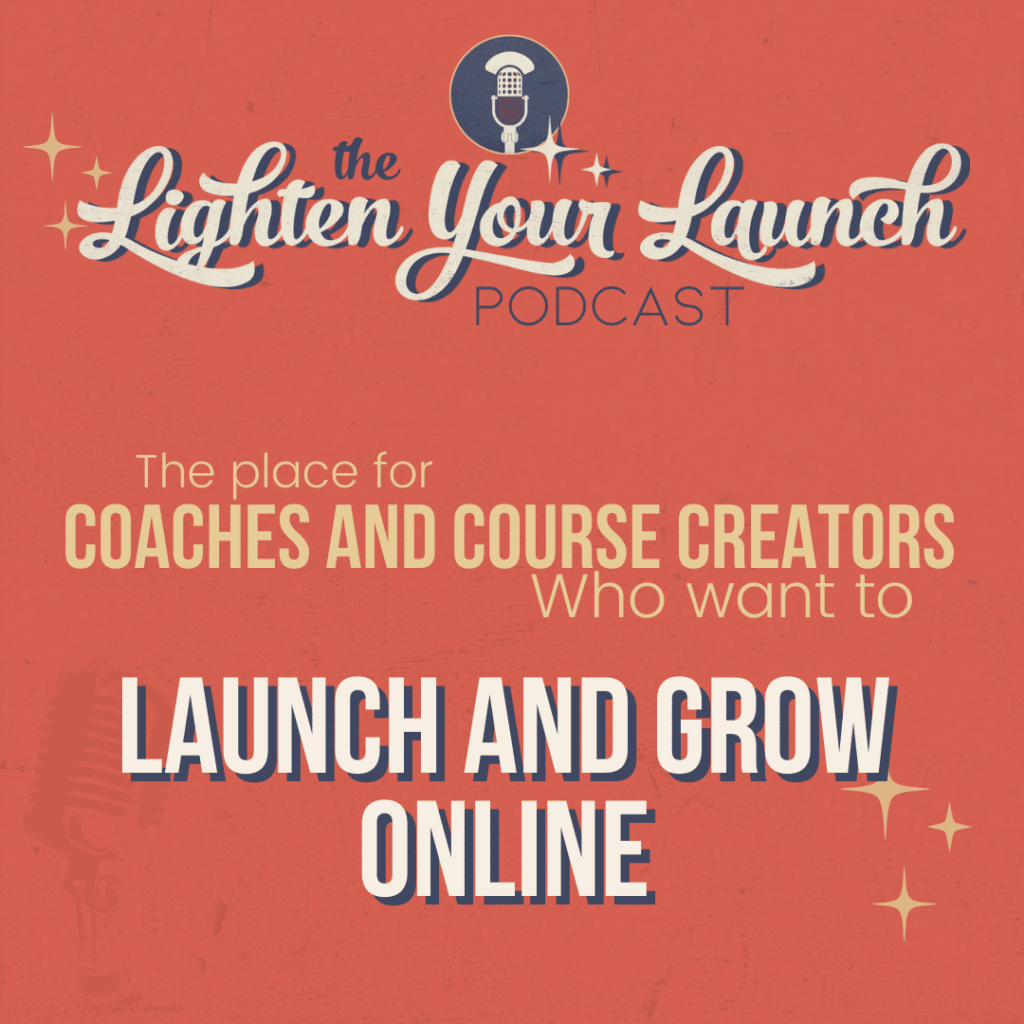
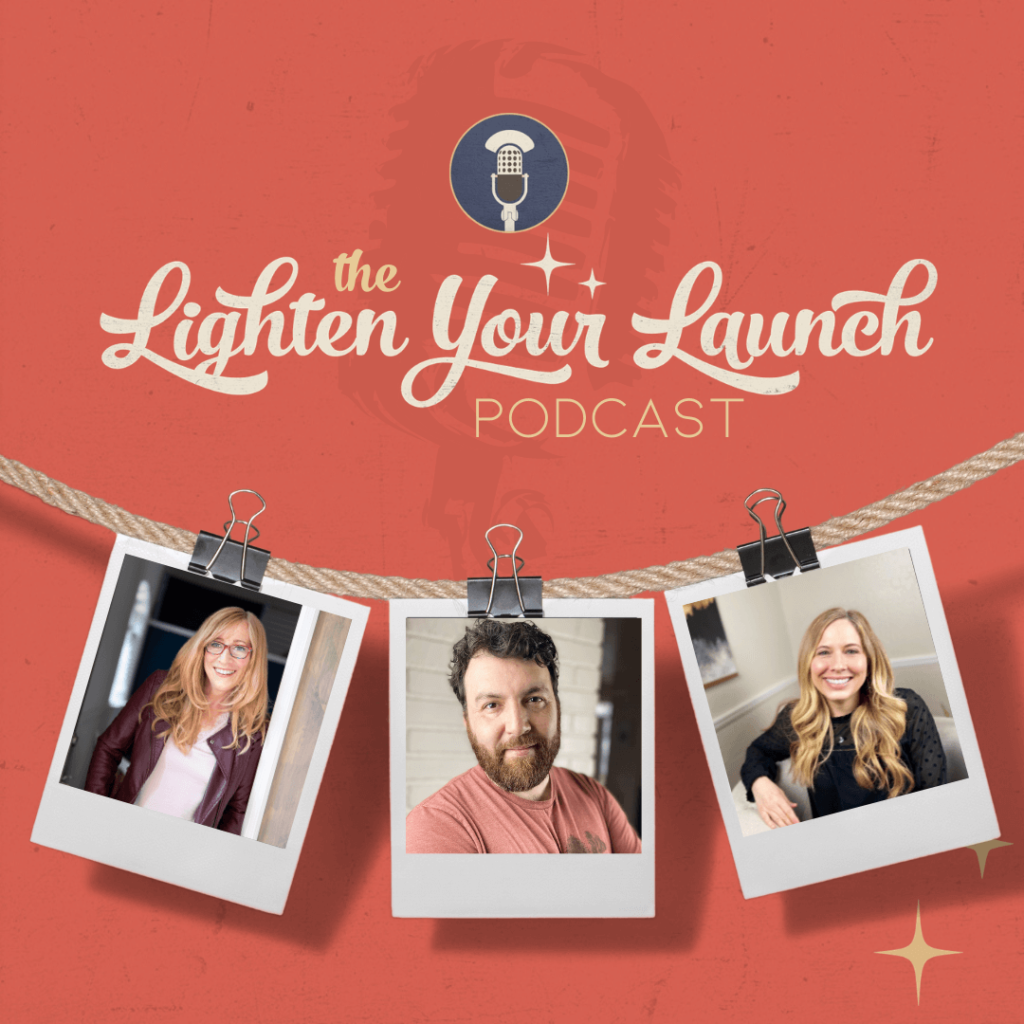


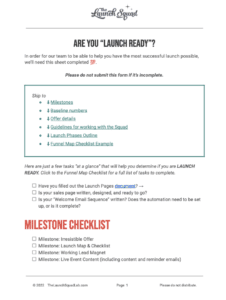
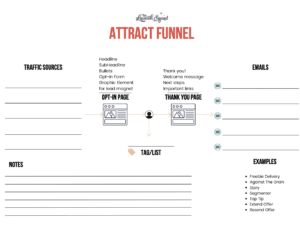
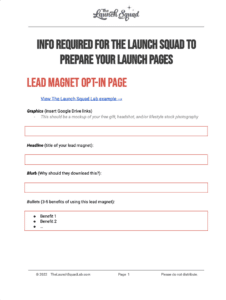
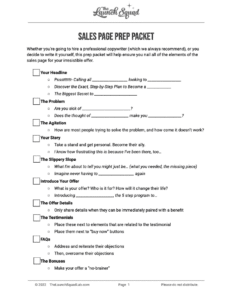
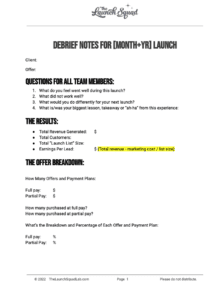
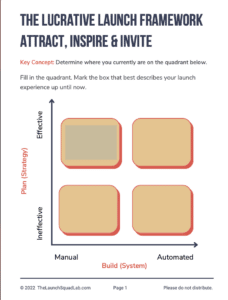
![Marketing Launch Calendar [TEMPLATE]](https://thelaunchsquadlab.com/wp-content/uploads/2023/05/Marketing-Launch-Calendar-TEMPLATE-300x260.png)
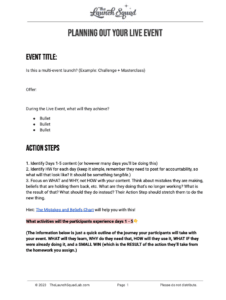
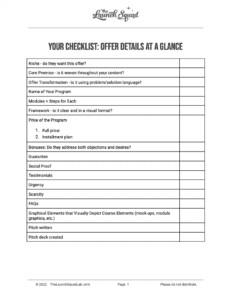
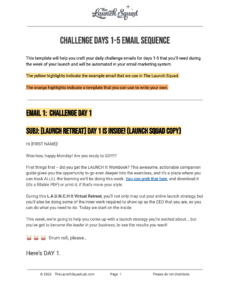
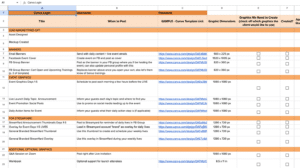
![[Updated] Email Templates for Launch](https://thelaunchsquadlab.com/wp-content/uploads/2023/05/Updated-Email-Templates-for-Launch-223x300.png)
![[REVISED] LS Pitch Script](https://thelaunchsquadlab.com/wp-content/uploads/2023/05/REVISED-LS-Pitch-Script-2023-226x300.png)

